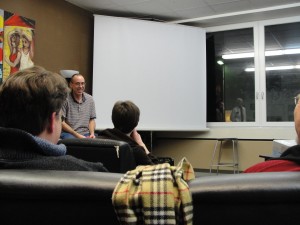Last night, the science department hosted a movie night: “Unlocking the Mystery of Life.”
The film discussed the complexities involved in life on earth; in looking at the evidence, it is basically impossible for life to form by chance. Natural selection only works in small incremental adjustments to DNA. Michael Behe (author of Darwin’s Black Box) identified something called “irreducible complexity,” which means that there is a very complex structure that exists, but all the parts have to exist simultaneously for it to be functional. If only some of the parts existed, it would be useless, and the parts would be eliminated through natural selection. It could not possibly have come to exist through natural selection. The movie gave the example of a bacterial flagellum. It has too many complicated parts that all work together simultaneously; it could not have been formed slowly and gradually.
The movie quoted Charles Darwin saying, “If it could be demonstrated that any complex organ existed, which could not possibly have been formed by numerous, successive, slight modifications, my theory would absolutely break down.”
In addition to irreducible complexity, the film addressed the complexity of DNA. At the base of Darwin’s “tree of life,” how did the first life form? In the past, people thought the cell was basically an energized blob. We now know, however, that the inside of a cell is as complex as Manhattan – except there are no traffic jams and no lawsuits! Some scientists hypothesized that life was formed when amino acids naturally bonded together to form the first proteins. Yet amino acids do not bond together without the DNA’s instructions. Furthermore, there are little machines in the cell that fold the amino acid chains into proteins, yet these machines are proteins themselves. How did those first proteins form?
Another question raised by the film and the discussion afterwards was that of information. Information is another element involved in science. Doc Parsons gave the example of a Shakespeare sonnet on a piece of paper. Scientifically, you can describe it by the chemical contents of the ink and the paper and how they bond, but that still does not describe the sonnet. You can digitally encode the sonnet and put it on your computer, and it is the same sonnet, but your “scientific” analysis is completely different. The information in Shakespeare’s sonnet supersedes the physical and chemical properties. Look at DNA the same way: you can analyze the chemical properties of it all you want, but there is information there that gives instructions to make complicated living things. That information came from somewhere. The complexity of DNA is beyond that of any computer software, yet we would never say that a computer happened by chance. It takes very intelligent people to write software (I should know; my brother is one of them!). When looking at a computer, it is logical to assume that an intelligent being made that machine. When looking at DNA, is it not also logical to see behind the perfect complexity an even more intelligent Being?
Michael Behe and others in the film approached the evidence from a very logical standpoint, and from what they could tell, there was no way that these things could be made by chance.
In many ways, it all boils down to what is considered science. Many scientists consider anything that involves God to be out of the realm of “pure” science. Deciding, however, to only look for evidence you can see (eliminating God before you even look at the evidence) is a metaphysical stance. Therefore, those who look only to “natural” forces are starting with philosophy, not science.
If there are any science people reading this, I apologize if I have described anything the wrong way using incorrect terms. This is not my field of expertise.


I attended BFA 2003-2007 and studied AP Bio and AP Chem under Doctor Parsons. I have three house mates where I am attending college who are grad students in science fields and have had discussions about this with them. None of them are believers. Because of my lack of knowledge on the subject in their mind I am spending my summer “Dispelling Ignorance,” as Doctor Parsons puts it.
I am pretty sure I do not know you, but my younger brother is attending BFA right now, Greg Goheen. He lives at Sonne. I was searching the internet and somehow came across this blog while looking up this topic.
Thanks for being a part of BFA, I was blessed to attend that school and am thankful for all who are a part of making it a quality Christian high school community.
Thanks for your response. I’m glad others can benefit from my musings!
I have seen Greg around school, although I’ve never had him in class and I haven’t subbed at Sonne. He’s good friends with one of my violin students, though, so his name comes up now and then.
Best wishes on ‘dispelling ignorance!’